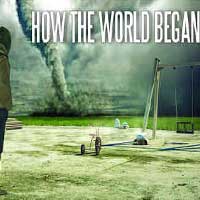
Rivendell Theatre Ensemble (RTE) bills itself as being “Chicago’s only Equity Theatre dedicated to producing new work with women at the core.” However, their current production, Catherine Trieshmann’s play “How the World Began,” can hardly be classified as a new play centering on women or women’s issues. It does begin with the metropolitan, single, and pregnant Susan Pierce (Rebecca Spence), who has left New York City to teach biology in rural Plainview, Kansas: a town recently decimated by a Tornado. In the first scene, she is confronted by a student named Micah Staab (Curtis Edward Jackson), who is confused by a comment she made so off-handedly during her first lecture about the origins of life that Susan can’t remember saying it, and is taken aback by her own statement and word-choice. When her ill-chosen and only somewhat ambiguous words (it’s pretty funny listening to her to try and defend a comment that she can’t remember making—but clearly did—against Micah’s intelligent and adroit cross-examination) become public knowledge, she is faced with an increasingly bizarre, and in her view incomprehensible, situation in which the small, rural, community erupts in controversy, culminating in very real threat of violence against Susan. Through the course the play, we watch Susan, the school’s principle, and Micah’s ad-hoc; non-legal; guardian, Gene Dinkel (Keith Kupferer), all futilely try to quell the situation.
That said, from the beginning up until nearly the very end, the play’s drama and tension come mostly from Sarah’s relationship with Micah and his problems, not Susan’s, as the his character’s background unfolds and the extent of the tragedy and trauma in his past slowly becomes clear. (He has been suffering from severe psychological symptoms since his father was killed in the Tornado.) Nor is the play new. It premiered in London during 2011 (an admittedly strange place for a play exploring the tension between science and religion through the lens of rural Kansas) and was staged again in New York City in 2012. That is not to say that a revival, especially at an Equity theatre in the Midwest where the audience is not quite as removed from American rural life and values as London or New York, isn’t a worthwhile endeavor. Patrons should just enter the Rivendell Theatre’s expecting something different than the ensemble’s usual fare.
Spence is extremely gifted as Susan, shifting seamlessly between a genuine desire and ability to help and nurture Micah, and a stoic, cold, reserve that borders on rejection which she attributes to propriety and professional distance. In her interactions with Micah and Gene, she repeatedly gains and loses our sympathy. While this sometimes disrupts the play’s narrative arc, leaving one feeling dizzy, it does mirror how we often experience other people in real life, especially those entrusted with power over us in the name of protecting and promoting our welfare from teacher’s to politicians. (Think of the range of Bush 43’ approval ratings.) Jackson is equally credible as Micah Staab, simulteanously conveying an extreme numbness in the face of his trauma and a fierce, intelligence based on reason and common sense which allows him to go toe-to-toe intellectually with his far more educated and worldly biology teacher.
Unlike Susan, Micah remains consistently sympathetic through most of the play until he articulates a theological cosmogony filled with the irrational threat of more violence, this times providential, unless Susan confesses her transgression to God: a position and belief which are at odds with his gifted intellect. However, it soon emerges that the level of trauma he experienced is far more severe than we (the audience) could possibly imagine, and the guilt, shame, and responsibility he feels over the Tornado’s devastation have distorted his worldview. During the climax of these revelations, Micah shifts suddenly (a change handled stunningly-well by Jackson) from an emotional numbness and intellectual rationality to an impassioned fear, shame, and guilt which are as intense and real to him as they would appear to someone else baseless and irrational. However, Trieschmann’s script and Keira Fromm’s direction skillfully keep Micah’s feelings and perspective first and foremost on display so that we are forced to see it from his perspective though few, if any of us, share the extremity of his views. 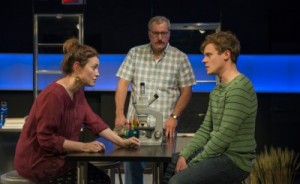
Likewise, Susan, who insists that she wants Micah to know that she believes that he is a bright, intelligent, young man with a great future ahead of him; that his perspective is not invalid; that belief in God and science are in no way incompatible; and that some of the greatest scientist are also Christians, will later hurl bigoted words which stand in stark contrast to her aforementioned convictions which she articulated with genuine sincerity. (She later retracts much of her hurtful words.) However, at the end of the play, it is hinted that, like Micah’s extremely unsophisticated theology, her paradoxical and hostile remarks, perhaps including the one she made in biology class (which were at the very least insensitive), might have their provenance in the recent trauma in her own past. The play’s last moment make us more emotionally confused and disarmed than ever: feelings which are accomplished both through Jackson and Spence’s gifted acting, and lighting (Rebecca Jeffords) and blocking techniques that are heavily theatrical and fairly predictable but highly effective.
As noted Pierce and Jackson give remarkably consistent, genuine, and highly credible performances in difficult roles which insist on paradoxical ideas and temperaments, rapid changes in demeanor, and the ability to instill in the audience dizzyingly shifting impressions. Here, the characters and performances are sophisticated, and where Trieschmann has added stereotypes (Susan learned yoga in New York City, a discipline which seems typical of a single, metropolitan women and Micah’s rustic common sense which has the feel of an idealized view of rural people), they may actually add to the verisimilitude of an audience that is highly urban or, at the very least, serve to remind us of the play’s context and setting. Unfortunately, stereotype goes over the top in the character of Gene Dinkel: as Trieshmann’s script, Fromm’s direction, and Kupferer’s performance all whole-heartedly embrace caricature. Gene, whose pastor is a young earth creationist, but who has settled for a worldview that seems to fall somewhere between evolution and intelligent design after “reviewing the evidence”, utters phrases like “thank you for choosing life,” “but they’re kin,” “sounds like those boys need a whippin’,” and describes a communal intimacy in Plainview so excessive and idealized that it has probably doesn’t exist in any contemporary rural community. Also, his performance and delivery can both be heavily stilted.
This choice to go for caricature over substance significantly damages the play, interfering with Kupferer’s ability to convey pathos over Gene’s truly tragic past which is unfortunate as it is the key to understanding the tension between him and Micah. (Micah views Gene’s actions as creepy and incomprehensible, but they are overtly paternalistic and clearly have roots in Gene’s intense desire to have son). Written and executed correctly, Gene’s character and relationship to Micah would have added another layer to the play in which three characters would have continually misunderstood and been unable to communicate or identify with each other because of their past trauma. In fact, I’m almost sure this was Trieschmann’s intention even if her script didn’t always facilitate it.
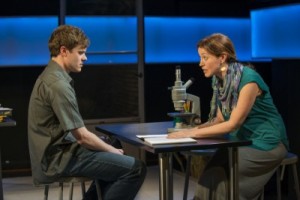 The costumes (Janice Pytel) are understated and remarkably convincing as contemporary rural dress, or in Susan’s case: metropolitan, and the scenic design (Megan Wilkerson) gives the setting a whimsical, isolated feel, and makes exterior action flexible. However, I thought that the highly realistic and classroom-appropriate props (Betty Thomas), along with some of Trieshmann’s dialogue, made it a little difficult to tell that Susan was teaching in a make shift trailer and not a proper school. That said, this didn’t significantly detract from the experience of the production.
The costumes (Janice Pytel) are understated and remarkably convincing as contemporary rural dress, or in Susan’s case: metropolitan, and the scenic design (Megan Wilkerson) gives the setting a whimsical, isolated feel, and makes exterior action flexible. However, I thought that the highly realistic and classroom-appropriate props (Betty Thomas), along with some of Trieshmann’s dialogue, made it a little difficult to tell that Susan was teaching in a make shift trailer and not a proper school. That said, this didn’t significantly detract from the experience of the production.
“How the World Began” is playing at the Rivendell Theatre Ensemble, located at 5779 N. Ridge Avenue in Chicago. It runs through October 10th, 2015 with performances Thursday through Saturdays at 8:00 pm with an additional 4:00 pm matinee each Saturday. Regular Tickets are $32 when bought from the box office and $35 at the door. Student, Senior, Veteran, and Active Duty Military tickets are $22 dollars at the box office and $25 dollars at the door. Five Seats (10 percent of the house) are available as pay as you can for each performance and are allotted on a first come, first serve basis. $110 Flex Pass ($80 for Students, Seniors, Veterans, and Active Duty Military) are available which are four tickets to use in any combination for the season. Tickets can be purchased by calling the box office at (773)-344-7228 or www.RivendellTheatre.org.
To see what others are saying, visit www.theatreinchicago.com, go to Review Round-Up and click at “How The World Began”





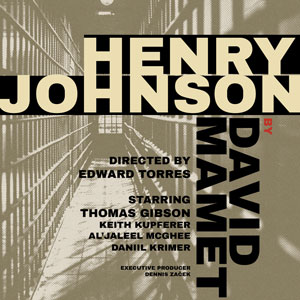
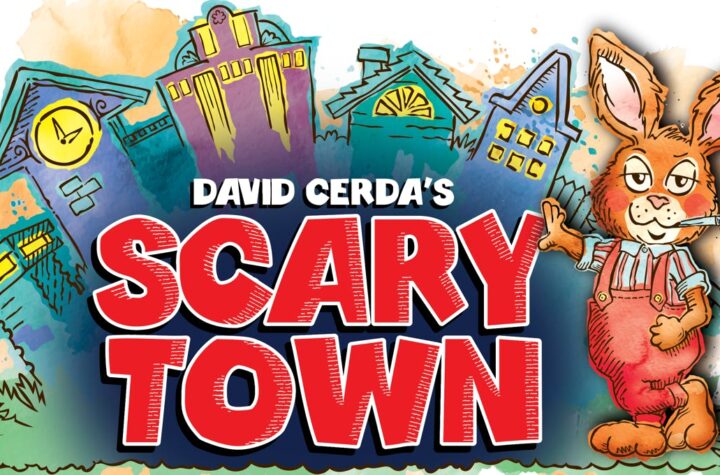
More Stories
“Henry Johnson”
“Scary Town” reviewed by Frank Meccia
“Translations”